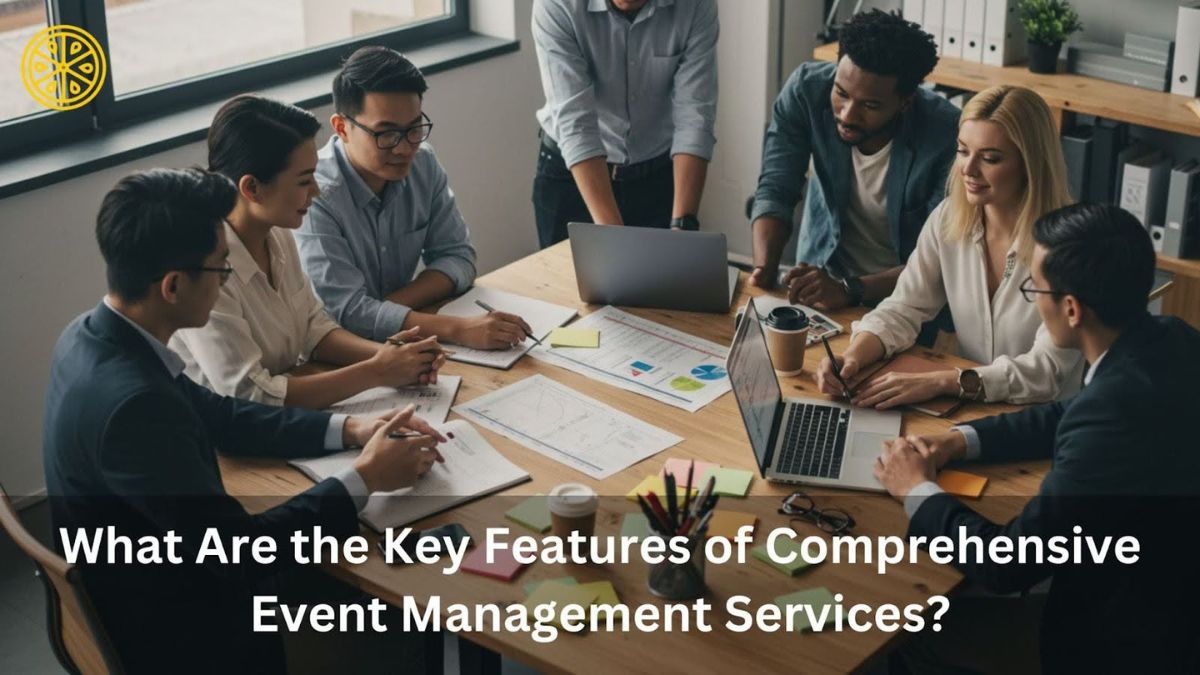TOPIC
What Are the Key Features of Comprehensive Event Management Services?

When planning an event, whether it’s a corporate gathering, a wedding, or even a large conference, the amount of details that need attention can be overwhelming. The big question that often arises is: “How can I ensure everything is handled professionally without having to manage all the logistics myself?” This is where comprehensive events management services come into play. But what exactly do these services entail, and how do they help make your event a success?
If you’re considering hiring event management professionals for your next big event, understanding the key features of these services is essential. In this article, I’ll walk you through the main elements that define comprehensive event management services and explain how each one contributes to the smooth execution of your event.
Why Choose Comprehensive Event Management Services?
Comprehensive event management services are designed to take the burden off your shoulders. From initial planning to post-event follow-up, these services cover every detail to ensure that your event runs smoothly and meets your objectives. When you hire experts in event management, you’re not just paying for a service; you’re gaining peace of mind. This means you can focus on the bigger picture—whether it’s networking, enjoying the event, or celebrating a special occasion—without worrying about the finer details.
One of the greatest benefits of hiring event management professionals is their ability to coordinate all aspects of your event. Whether it’s booking a venue, coordinating vendors, or creating a timeline, professionals have the expertise and the resources to handle it all efficiently. So, what are the key features that make these services comprehensive and reliable?
What Are the Key Features of Comprehensive Event Management Services?
1. Detailed Event Planning and Coordination
At the heart of any comprehensive event management service is meticulous planning and coordination. Event planners will work closely with you to understand your goals and expectations. They will map out every detail, from the schedule to the theme, the venue layout, and guest management.
This feature ensures that all logistics are handled effectively, from the early stages of the event planning process right up until the event itself. A key aspect of this process is creating a detailed timeline that outlines when each element of the event needs to take place. The timeline ensures that everything happens at the right time and in the correct order.
For example, if you are hosting a corporate event, your event manager will ensure that the keynote speaker arrives on time, the food is served at the correct intervals, and the audio-visual equipment is set up for presentations. Their coordination ensures that the event flows without interruptions.
2. Budget Management
Budgeting is one of the most challenging aspects of organizing an event. From the venue to catering, decorations, and entertainment, costs can quickly add up. This is where event management services come in. They help you establish a budget from the very beginning and ensure that all aspects of the event fit within that budget.
A good event management service will provide you with a detailed cost breakdown and give you transparency regarding how your funds are being spent. They are also skilled at negotiating with vendors to get the best value for your money. If something unexpected arises, the event manager will know how to make adjustments to keep the event within budget without sacrificing quality.
For instance, if you initially planned to hire a premium caterer but are now looking to save costs, they can suggest more affordable catering options that still maintain high standards.
3. Vendor Coordination
One of the most time-consuming parts of event planning is managing vendors. Whether you need a caterer, florist, audio-visual technician, or transportation service, an event management company has an extensive network of trusted vendors. They can recommend the best vendors that match your budget and requirements, and they will handle all the communications with these suppliers on your behalf.
Vendor coordination is a critical part of event planning. It involves ensuring that all vendors deliver their services as agreed, on time, and within budget. Event managers typically handle the contracts, confirm bookings, and check in with vendors leading up to the event.
For example, if you’re hosting a wedding, your event manager will liaise with the florist to confirm the flower arrangements, the caterer to finalize the menu, and the entertainment team to ensure that the schedule runs smoothly. They’ll ensure that all vendors work in sync, allowing you to focus on enjoying the event.
4. Venue Selection and Management
Selecting the right venue is essential for the success of your event. An experienced event management service will help you choose a venue that aligns with your event’s purpose, theme, and guest size. They are familiar with a wide range of venues, from large conference centers to intimate banquet halls or outdoor locations.
Not only will they help you select the venue, but they will also manage all aspects related to it. This includes negotiating contracts, securing permits, and ensuring that the venue is set up properly for your event. Event managers also handle logistical issues such as parking, security, and accommodation arrangements for out-of-town guests.
Imagine you are organizing an annual corporate seminar. The event management service will assist you in selecting a venue with the right capacity, location, and facilities, ensuring it suits your event’s tone and audience.
5. On-Site Event Management
On the day of your event, having a team on-site to manage everything is crucial. On-site event management ensures that the event runs smoothly, without any hitches. This includes overseeing the setup, managing the event schedule, handling vendor deliveries, and addressing any issues that arise during the event.
Having professionals manage things on-site allows you to focus on enjoying the event. Whether it’s directing guests, coordinating speeches, or making sure all the planned activities take place on time, the event management team is there to handle the heavy lifting.
For example, if there’s an issue with the sound system during a presentation, the event manager will know exactly how to fix it, so you don’t have to worry about technical problems.
6. Event Marketing and Promotion
For public events, such as trade shows, product launches, or fundraisers, event marketing is essential to attract attendees and generate interest. Comprehensive event management services often include marketing and promotional strategies. This may involve creating event websites, social media promotion, email marketing, and even paid advertising.
Event managers work with you to develop a marketing strategy that aligns with your event’s goals and target audience. They know the best ways to generate buzz and ensure that your event is well-attended.
For instance, if you are launching a new product, an event manager might help you design a targeted ad campaign or work with influencers to promote your event. Their goal is to increase visibility and ensure that the right people show up.
7. Risk Management and Contingency Planning
No matter how well you plan, things can go wrong on the day of the event. Whether it’s unexpected weather changes, technical malfunctions, or last-minute cancellations, risk management is essential. An experienced event management service will have contingency plans in place to handle any issues that arise.
For instance, if you’re hosting an outdoor event and it begins to rain, the event manager will have a backup plan to move the event indoors or provide tents to keep guests dry. They will also have solutions for common problems like transportation delays or catering shortages.
8. Post-Event Follow-up
Once the event is over, the job isn’t finished. Comprehensive event management services typically include post-event follow-up to ensure everything has gone as planned and to gather feedback from attendees. This feedback can be used to assess the success of the event and inform future planning.
For example, if you’re hosting a corporate event, post-event surveys can help gather insights on what went well and what could be improved. The event management service can also assist with thank-you emails to attendees, handling lost items, and managing vendor payments.
Conclusion
Comprehensive event management services cover all aspects of event planning and execution, from the early stages of budgeting and venue selection to the final follow-up after the event. By hiring professionals to manage your event, you can ensure that everything runs smoothly, on time, and within budget. These services are designed to take the stress out of event planning, allowing you to focus on enjoying the event and achieving your business goals. Whether you’re hosting a large conference or a small business event, working with experts in event management ensures that your event will be a success.
By choosing the right event management company, you’re not just hiring a planner; you’re investing in a seamless event experience that will leave a lasting impression on your attendees.
TOPIC
How Wildlife‑Related Crashes Affect Liability And Insurance Claims

Every year, wildlife causes thousands of accidents on our roads. These crashes can be distressing and lead to unexpected consequences. When you collide with an animal, you’re not just facing potential damage to your car. You might also deal with serious injuries and complex insurance claims. Understanding your liability in these situations is crucial. Insurance policies often vary, and knowing what to expect can help you navigate this tricky situation. You may wonder about coverage for repairs and medical costs. Or perhaps you’re concerned about how this affects your insurance rates. Each situation is different, and the details matter. Learn about your rights and responsibilities to protect yourself better. It’s essential to stay informed. As you drive, stay alert and watch the road. Discover more about how wildlife-related crashes impact your insurance claims and liabilities. Your awareness could make a significant difference in your life.
Understanding Wildlife-Related Crashes
Encountering wildlife on the road can be sudden and frightening. Animals like deer, moose, and even smaller animals pose significant risks. The damage can be extensive, affecting both your vehicle and your peace of mind. These incidents often happen during dawn and dusk when animals are most active. Avoiding such crashes requires vigilance and quick reactions. However, accidents still occur despite your best efforts.
Liability in Wildlife-Related Accidents
Determining liability in wildlife accidents is often complex. Generally, no one owns wild animals, so the responsibility doesn’t fall on a specific party. If you collide with wildlife, liability typically rests with the driver. This means you could be responsible for repair costs and potential increases in insurance premiums. Knowing what your insurance covers is essential. Comprehensive coverage often includes animal collisions, while liability insurance does not. Reviewing your policy details can prevent surprises later.
Insurance Claims: What to Expect
Filing an insurance claim after a wildlife crash can seem daunting. Knowing the steps to take can ease the process. First, ensure everyone’s safety and contact authorities if necessary. Document the incident with photos and notes about the conditions and time. Contact your insurance company promptly to report the accident. Each insurer may handle claims differently, so understanding your policy helps. Coverage for repairs, medical costs, and even towing depends on your insurance type.
Comparing Coverage Types
| Coverage Type | Includes Wildlife Collisions | Repair Costs Covered |
| Liability Insurance | No | No |
| Comprehensive Insurance | Yes | Yes |
| Collision Insurance | Sometimes | Depends on the provider |
This table shows how different coverage types handle wildlife collisions. Comprehensive insurance is your safest bet for full coverage in these scenarios. Always review your policy documents to understand your coverage scope.
Prevention and Safety Tips
Preventing wildlife crashes involves both awareness and action. Stay attentive, especially in areas with high animal activity. Use high beams when safe to spot animals earlier. Slowing down can give you more time to react. In areas with frequent wildlife crossings, be extra cautious. Whistles or devices claiming to deter animals are often ineffective. Instead, focus on driving carefully and maintaining control at all times. For more safety tips, visit National Highway Traffic Safety Administration.
The Role of the Community
Communities can play a part in reducing wildlife-related accidents. Local measures like installing signs or creating wildlife corridors can help. Educating drivers about high-risk areas and times is effective. Collaborating with local wildlife experts to understand animal patterns can also reduce incidents. Community effort is key to safer roads for everyone.
Conclusion
Wildlife-related crashes are unpredictable but manageable. By understanding your insurance policy and knowing your responsibilities, you can better handle these incidents. Prevention is key, but when accidents happen, being prepared helps. Ensure your policy covers potential wildlife encounters. Stay informed and cautious on the road. By taking these steps, you protect yourself and others. Drive safely and stay aware to minimize risks and enjoy peace of mind.
TOPIC
What To Do If A Drunk Driver Causes A Fatal Accident

A fatal accident involving a drunk driver shatters lives. If you face this tragedy, knowing your next steps is crucial. This guide helps you navigate these challenging moments. First, ensure your safety and others around you. Contact emergency services immediately. Authorities need to secure the scene and gather evidence. Then, reach out to family or friends for emotional support. The impact of such an event can be overwhelming. Seek professional legal advice promptly. Legal experts can help you understand your rights and options. Their assistance may be vital in ensuring justice for your loved one. Document everything you remember about the incident. Details can be essential later. Also, consider seeking counseling. Emotional recovery is as important as legal resolution. Addressing these steps eases the burden during this difficult time. Being prepared supports you in handling this tragic situation with strength and clarity. You are not alone in this journey.
Immediate Steps After the Accident
Once the scene is secure, focus on gathering information. Collect the names and contact numbers of witnesses. Take photos of the accident site if possible. These will aid in building your case. Understandably, emotions run high. However, clear documentation is crucial. Law enforcement will compile a report. Request a copy for your records. This report contains essential details. It will be crucial for legal and insurance purposes.
Legal Considerations
Engaging with the legal system can be daunting. Yet, it is an important step forward. Secure a reputable attorney experienced in dealing with drunk driving incidents. They will navigate the complexities of the law on your behalf. Start this process early. Legal procedures often require extensive time and effort. The attorney will help file claims and represent you in court if necessary.
Emotional and Psychological Support
Processing grief and trauma requires time and support. Many find comfort in speaking with counselors or support groups. There are professionals trained to help you through this difficult period. Friends and family members are also invaluable. Be open about your needs and feelings. They can offer a listening ear and necessary support.
| Support Option | Advantages | Disadvantages |
| Professional Counseling | Expert guidance, Confidential | Costly, Requires scheduling |
| Support Groups | Shared experiences, Community support | Availability varies, Less personalized |
| Family and Friends | Immediate availability, Emotional bond | May lack expertise, Emotionally invested |
Financial and Insurance Matters
Accidents lead to unexpected financial burdens. Insurance claims need to be filed promptly. Contact your insurance company to start the process. Provide them with the accident report and any additional information. It is also wise to consult with your legal advisor during this stage. They can ensure all documents are appropriately handled. In some cases, the process may lead to compensation. This can aid with medical or funeral expenses.
Long-Term Recovery and Resolution
Healing from this tragedy takes time. Some days will be harder than others. Establishing a routine can help restore a sense of normalcy. Engage in activities that bring you relief and comfort. Consider joining initiatives that advocate against drunk driving. Contributing to a cause may offer a sense of purpose.
Additional Resources
For more guidance, visit the National Highway Traffic Safety Administration (NHTSA). They offer resources on dealing with drunk driving incidents. You can also explore the Mothers Against Drunk Driving (MADD) website for support networks and advocacy opportunities.
Dealing with the aftermath of a drunk driving accident is a profound challenge. Each step taken brings you closer to resolution and healing. Reliable support and information make a significant difference. Remember, while the journey is difficult, you have resources and people ready to help. By taking active steps, you honor the memory of your loved one and contribute to a safer community.
TOPIC
How To Prove Liability In A Las Vegas Personal Injury Lawsuit

When you’re injured in Las Vegas, proving who is responsible matters. Understanding how to prove liability is crucial. This guide breaks down what you need to know for a personal injury lawsuit. You might feel overwhelmed, but remember, you are not alone. Liability determines who pays for damages and injuries. You need evidence to show fault clearly. FriedmanInjuryLaw offers support in gathering this evidence. First, you need to collect reports and witness accounts. Second, document medical records and expenses. Finally, maintain communication records with all involved parties. Each step helps reinforce your case. It’s essential to stay focused and organized. Legal processes may seem daunting, but staying informed helps you reclaim control. Everyone deserves justice and the means to heal. You can navigate this challenge with careful preparation and support. This blog offers insights to help you through each stage of the process. You hold the key to your case’s success.
Gathering Evidence
Evidence is the backbone of your case. To prove liability, compile detailed information about the incident. Start with the police report. This document provides an official account of the event. Witness statements strengthen your case. They offer unbiased perspectives on what happened. Photos of the accident scene can capture crucial details. Visual evidence can clarify how events unfolded.
Medical Documentation
Your injuries are a critical part of the evidence. Medical records document the extent and impact of your injuries. They connect your injuries to the incident. Keep all medical bills and related expenses. This information supports claims for financial compensation.
Communication Records
Keep a detailed log of all communications. This includes interactions with insurance companies and other parties. Emails, letters, and phone call notes can reveal valuable information. They can show offers, admissions, or statements that affect responsibility.
Types of Liability
Understanding liability types helps you build a stronger case. Here are common types:
- Negligence: Failing to act with reasonable care.
- Strict Liability: Responsibility without proof of fault, common in product liability cases.
- Intentional Wrongdoing: Harm caused on purpose.
Comparative Negligence in Nevada
Nevada follows a comparative negligence rule. If you share some fault, it affects your compensation. For example, if you are 20% at fault, your damages reduce by 20%. Understanding this rule is vital for realistic expectations.
Comparison Table: Types of Liability
| Type | Description | Proof Required |
| Negligence | Lack of reasonable care | Prove negligence elements |
| Strict Liability | Liability without fault | Show defect and harm |
| Intentional Wrongdoing | Harm by deliberate action | Prove intent |
Legal Support and Resources
Pursuing a lawsuit is complex. Legal assistance can guide you. Experienced attorneys know the process well. They can help you build your case effectively. USA.gov offers resources for finding legal aid in Nevada.
Conclusion
Proving liability in a personal injury lawsuit requires diligence and determination. By gathering comprehensive evidence, documenting medical details, and understanding liability types, you can build a compelling case. Resources like LawHelp.org provide valuable information for those seeking legal guidance. Stay organized and informed throughout the process. With careful preparation and support, you can achieve the justice you deserve.
-

 BLOG2 months ago
BLOG2 months agoIZoneMedia360 .Com: Exploring the Features and Benefits
-

 BLOG5 months ago
BLOG5 months agoAbout Blog TurboGeekOrg: A Go-To Hub for Tech Enthusiasts and Latest Innovations
-

 BLOG5 months ago
BLOG5 months agoWhat is a Golden Transit in Magi Astrology?
-

 BLOG2 months ago
BLOG2 months agoA Complete Guide to ProcurementNation.com Shipping
-

 ENTERTAINMENT5 months ago
ENTERTAINMENT5 months agoTyquaez Pickett: A Rising Star in the Entertainment World
-

 NEWS1 month ago
NEWS1 month agoChloe Berger News: Insights on Employee Rights and Talent Retention
-

 HOME2 months ago
HOME2 months ago5StarsStocks.com Nickel: Invest for a Bright Future
-

 BLOG4 months ago
BLOG4 months agoWho Is Hall Sinclair? The True Story of Olivia Colman’s Son
